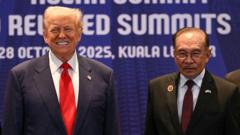Does Trump Really Aim to Overthrow Our Government? Venezuelan Official Speaks Out

Published: 2025-10-27 04:00:08 | Category: world
The recent statements from Venezuela's Attorney General, Tarek William Saab, suggest that US President Donald Trump aims to turn Venezuela into a "colony" of the United States. Saab's comments highlight growing tensions between the two nations, with claims that US actions are motivated by a desire to seize Venezuela's natural resources, including its vast reserves of gold, oil, and copper. This article will explore the implications of these tensions, the international response, and what the future may hold for Venezuela and its relations with the US.
Last updated: 06 October 2023 (BST)
What’s happening now
Venezuela is experiencing heightened military and political tensions with the United States, particularly under the leadership of President Donald Trump. Saab's comments underscore the perception that US intervention is not merely diplomatic but aimed at regime change and resource appropriation. The US has bolstered its military presence in the Caribbean, raising alarms in Caracas about a potential invasion. The Venezuelan government remains defiant, asserting its readiness to counter any aggression while also expressing a willingness to engage in dialogue.
Key takeaways
- Venezuela's government accuses the US of attempting to seize its natural resources.
- Trump has hinted at potential military action against Venezuela.
- US military presence in the Caribbean is at a decades-high level.
Timeline: how we got here
The escalating tensions have developed over several years, but key events include:
- January 2019: Juan Guaidó declares himself interim president, contesting Maduro's legitimacy.
- February 2020: The US imposes further sanctions targeting Venezuelan oil exports.
- September 2023: Trump authorises military strikes against alleged drug vessels off Venezuela's coast.
- October 2023: Venezuela warns against US military provocations as US warships arrive in the Caribbean.
What’s new vs what’s known
New today/this week
The US has increased military deployments in the Caribbean, with the arrival of warships and aircraft as part of a crackdown on drug trafficking. Saab's statements reflect an urgent plea for international recognition of Venezuela’s sovereignty, while Trump’s administration appears poised for potential military actions.
What was already established
Historically, the US has not recognised Nicolás Maduro as Venezuela's legitimate leader, labelling his administration as undemocratic following the controversial elections. The Venezuelan government has long accused the US of interference, especially regarding its resource-rich economy.
Impact for the UK
Consumers and households
The geopolitical tensions could affect global oil prices, impacting UK consumers through increased fuel costs and inflation. Additionally, any military conflict may disrupt international trade routes, affecting goods availability.
Businesses and jobs
UK businesses with investments in Latin America may face uncertainties related to trade policies and sanctions. Industries dependent on oil imports could see greater volatility in prices and availability as US actions unfold.
Policy and regulation
The UK government may need to navigate its position on Venezuela carefully, balancing diplomatic relations with the US and its stance on human rights and democracy in Venezuela. Upcoming discussions in international forums may address the legality and ethical implications of US military actions.
Numbers that matter
- 43: Number of reported fatalities in recent US military operations against alleged drug vessels.
- 40: Estimated number of warships and aircraft deployed by the US in the Caribbean region.
- 2024: Year of Venezuela's last election, widely deemed neither free nor fair.
Definitions and jargon buster
- False flag operation: A covert operation designed to deceive by disguising the actual source of responsibility.
- Regime change: The act of replacing one government with another, often through non-democratic means.
How to think about the next steps
Near term (0–4 weeks)
Watch for further developments regarding US military actions and any responses from Venezuela. Increased military presence may lead to heightened tensions and potential conflict.
Medium term (1–6 months)
Monitor the progress of US-Venezuela relations and any shifts in diplomatic efforts. Changes in the geopolitical landscape may arise depending on the outcomes of military operations and international reactions.
Signals to watch
- Statements from US Congressional members regarding military authorisation.
- Venezuela's responses to US military deployments.
- Changes in global oil prices and trade routes.
Practical guidance
Do
- Stay informed about geopolitical developments that may affect trade and energy prices.
- Engage in discussions about the implications of foreign policies on local economies.
Don’t
- Underestimate the potential for escalation in military actions.
- Dismiss the impact of global tension on local economic conditions.
Checklist
- Review your household budget to account for potential increases in energy costs.
- Keep abreast of news regarding international relations and military actions.
- Consider diversifying investments in case of economic instability.
Risks, caveats, and uncertainties
The situation remains fluid, with uncertainties around US military intentions and Venezuela's response. Analysts caution against assuming immediate conflict, as diplomatic channels may still play a role. The narrative of resource appropriation complicates the region's geopolitical dynamics, with potential backlash against US actions from Latin American allies.
Bottom line
The escalating tensions between the US and Venezuela illustrate a complex geopolitical landscape, with both military and diplomatic avenues in play. UK readers should stay informed about how these developments may affect global economic conditions, particularly in energy markets and trade.
FAQs
What is the US's current military stance towards Venezuela?
The US has increased its military presence in the Caribbean, signalling a potential for further action against Venezuela amid claims of drug trafficking and regime change.
How has Venezuela responded to US military actions?
Venezuela has condemned US military deployments as provocations and expressed readiness to counter any aggression while remaining open to dialogue.
What are the implications for UK consumers?
UK consumers may experience fluctuations in oil prices and increased costs due to geopolitical tensions, which could impact household budgets and inflation rates.



